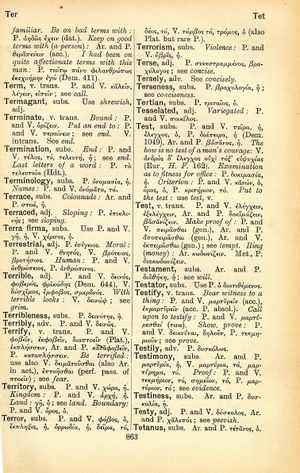testator: Difference between revisions
From LSJ
πρὸς υἱὸν ὀργὴν οὐκ ἔχει χρηστὸς πατήρ → The good father does not hold anger towards his son (Chaeremon, fragment 35)
(CSV5) |
(6_16) |
||
| Line 3: | Line 3: | ||
Use P. ὁ διατιθέμενος. | Use P. ὁ διατιθέμενος. | ||
}} | |||
{{Lewis | |||
|lshtext=<b>testātor</b>: ōris, m. [[testor]].<br /><b>I</b> One [[who]] bears [[witness]] or testifies to a [[thing]], a [[witness]] ([[very]] [[rare]]), Prud. Cath. 12, 85.—<br /><b>II</b> One [[who]] makes a [[will]] or [[testament]], a [[testator]] (the predom. jurid. signif. of the [[word]], [[but]] not in Cic.), Dig. 28, 3, 17; 31, 1, 89; Suet. Ner. 17; Lact. 4, 20 al. | |||
}} | }} | ||
Revision as of 09:08, 13 August 2017
English > Greek (Woodhouse)
subs.
Use P. ὁ διατιθέμενος.
Latin > English (Lewis & Short)
testātor: ōris, m. testor.
I One who bears witness or testifies to a thing, a witness (very rare), Prud. Cath. 12, 85.—
II One who makes a will or testament, a testator (the predom. jurid. signif. of the word, but not in Cic.), Dig. 28, 3, 17; 31, 1, 89; Suet. Ner. 17; Lact. 4, 20 al.

